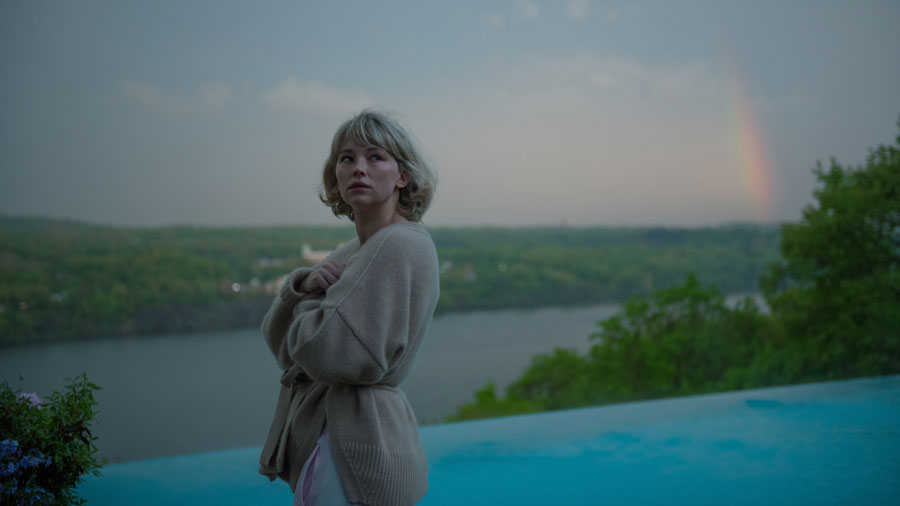Estados Unidos, Francia, 2019
Dirección: Carlo Mirabella-Davis
Guion / Script: Carlo Mirabella-Davis.
Producción / Production: Mollye Asher, Mynette Louie, Carole Baraton, Frederic Fiore.
Fotografía / Cinematography: Katelin Arizmendi.
Edición / Film editing: Joe Murphy.
Intérpretes / Cast: Haley Bennett, Austin Stowell, Elizabeth Marvel, David Rasche, Denis O’Hare.
Duración: 91 minutos
Hunter parece llevar una vida perfecta junto a Richie, su esposo, que acaba de hacerse cargo de la administración del negocio familiar. Pero al quedar embarazada, desarrolla un trastorno alimentario, el llamado síndrome de Pica, que se caracteriza por la ingestión compulsiva de objetos no comestibles. Su esposo y sus suegros deciden controlar cada movimiento para evitar que dañe la estirpe familiar. Pero esta extraña e incontrolable obsesión oculta un oscuro secreto.
Swallow es un drama psicológico con elementos de thriller que plantea una lúcida reflexión sobre las expectativas de género. El primer plano del film, donde aparece la protagonista de espaldas, sola, contemplando la inmensidad del horizonte desde su lujosa e infranqueable casa de muñecas, ya resulta muy clarificador. Hunter es la esposa perfecta. Es bella, elegante, prudente y complaciente, pero también tremendamente infeliz. Es por eso que empieza su propensión por tragarse cosas —de ahí el doble sentido del título, dado que además de golondrina, swallowen inglés también significa tragar—, un acto compulsivo que le otorga poder sobre sí misma, sobre su cuerpo y sobre sus deseos íntimos. En la línea de Marnie , de Hitchcock, Carlo Mirabella-Davis ofrece al público una lectura realista y elaborada de una alteración psicológica, que le sirve de plataforma para denunciar lo absurdo de una sociedad alienada, asfixiada por unas normas ridículas y destructivas.
Hunter seems to lead a perfect life with Richie, her husband, who has just taken over managing the family business. But after she becomes pregnant, she develops an eating disorder, the so-called pica disorder, characterized by compulsively eating non-nutritive objects. Her husband and in-laws decide to control her every move to avoid damage to the family lineage. But this strange and uncontrollable obsession hides a dark secret. Swallow is a psychological drama with thriller elements that provides a lucid reflection on gender expectations. The opening shot of the film, where the protagonist is alone with her back turned from the camera, contemplating the immensity of the horizon from her luxurious and impenetrable dollhouse, is already extremely telling. Hunter is the perfect wife. She’s beautiful, elegant, sensible and obliging, but also extremely unhappy. This is how her tendency to swallow things begins—a double meaning in the title of the film, referring to both the bird and the action—, a compulsive act that gives her power over herself, over her body and over her inner desires. Along the lines of Marnieby Hitchcock, Carlo Mirabella-Davis offers the audience a realistic and elaborate interpretation of a psychological ailment that serves as a platform to denounce the absurdity of an alienated society, suffocated by ridiculous and destructive rules.
Carlo Mirabella-Davis
Nueva York, Estados Unidos, 1986 / New York, USA, 1986
Compró su primera cámara Super 8 a los 14 años y pasó su adolescencia haciendo películas con sus amigos. Estudió producción en la Tisch School of the Arts de Nueva York. Dirigió el corto Knife point (2009) y codirigió el documental The swell season (2011) junto a Nick August-Perna y Chris Dapkins. Ha impartido clases de cine a estudiantes de la Universidad de Nueva York durante más de diez años.
He bought his first Super 8 camera when he was 14 and spent his adolescence making films with his friends. He studied production at the Tisch School of the Arts in New York. He directed the short Knife Point (2009) and co-directed the documentary The Swell Season (2011) with Nick August-Perna and Chris Dapkins. He has taught film to students at New York University for over ten years.
